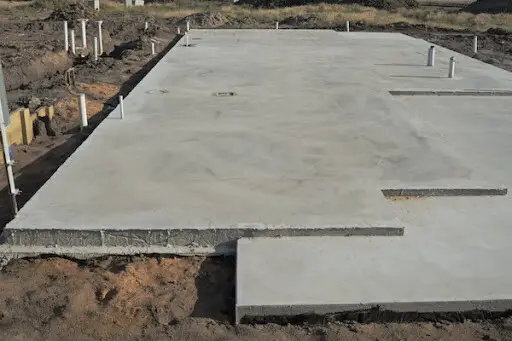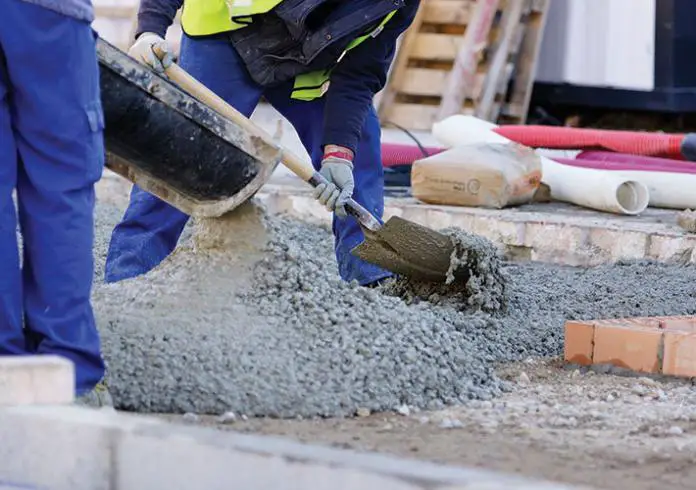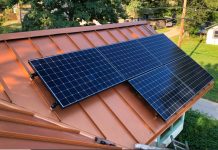In civil engineering construction works, contractors bidding for a job are always required to specify the rate they will use in executing a given item of work. In a competitive bidding, the client will review the rates supplied by the bidders, and award the contract to the person he finds most suitable.
Concrete is a common construction material that is basically made from cement, sand, gravel, and water. The main aim of this article is to teach you how to build up your rate, and quote for concrete in construction works.
The unit of concrete in construction is specified in cubic metres (m3). For instance, if a floor slab has a net area of 250 m2, and a thickness of 150 mm, the volume of concrete required will be stated as (250 x 0.15 = 37.5 m3). In the bill, a contractor is expected to state the cost of casting a cubic metre of the specified grade concrete (say grade 25), which can be used to relate the cost of casting the entire slab.
Note that the rate supplied by the contractor is expected to include the cost of materials, plant, transportation, labour, and contractor’s profits.

There are basic considerations to make while quoting for concrete because you should not bid too high or too low. It is possible for contractors to have a wide difference in their rates for the same job. For a competitive tender without bias, a company that is going to hire equipment will likely bid higher than a company that has its own equipment. The same goes with labour, transport facilities, etc.
Bidding for a job should be an intelligent process, and the contractor should know his capacity as it will likely influence his cost and profitability. The cost of casting concrete in one day is not the same with casting it for two days. Therefore, a contractor’s capacity can enable him bid higher or lower depending on the context.

To make it simpler, let us give an idea on how you can build up your rate for grade 25 concrete.
In the past, we have made a post on how you can achieve grade 25 concrete on site. We were able to show that the mix ratio of 1:2.5:3.5 can yield grade 25 concrete. Let us assume you wish to use this mix ratio in building your rate.
The total volume in the mix ratio is given by;
1 + 2.5 + 3.5 = 7
Cement
Ratio of cement by volume = 1/7
Density = mass/volume
Mass of cement required = (1/7) x 1440 = 205.7 kg
Making allowance for shrinkage = 1.54 x 205.7 = 316.77 kg
Number of bags of cement required per of concrete = 316.77/50 = 6.33 bags (use 7 bags)
Sand
Ratio of sand by volume = 2.5/7
Density = mass/volume
Mass of sand required = (2.5/7) x 1650 = 589.285 kg
Making allowance for shrinkage = 1.54 x 589.285 = 907.498 kg
Making allowance for waste = 1.2 x 907.498 = 1088.99 kg/m3
Granite
Ratio of granite by volume = 3.5/7
Density = mass/volume
Mass of granite required = (3.5/7) x 1650 = 825 kg
Making allowance for shrinkage = 1.54 x 825 = 1270.5 kg
Making allowance for waste = 1.15 x 1270.5 = 1461.075 kg/m3
Build up of rates
(a) Materials
Mix ratio = 1:2.5:3.5
Cement = 7 bags/m3
Sand = 1088.99 kg/m3
Aggregate = 1461.075 kg/m3
Market Prices of Materials including transportation to site;
Cement = ₦4100 per bag
Sharp sand = ₦ 3500 per tonne
Granite aggregate = ₦ 16000 per tonne (the current basic rate of granite is about NGN 9000 per tonne, but the cost of transportation is currently so high)
Cost of materials
Cost of cement per cubic metre concrete = 7 x 4,100 = ₦28,700
Cost of sharp sand per cubic metre of concrete = 3500 x 1.08899 = ₦3,812
Cost of granite per cubic metre of concrete = 16000 x 1.461 = ₦23,376
Total Material Cost = ₦55,888 per cubic metre of concrete
(b) Plant
Rate of Concrete mixer per cubic metre of concrete = ₦600
Rate of vibrator per cubic metre of concrete = ₦350
Operator = ₦500
Total Plant Cost = ₦1,450 per cubic metre of concrete
(c) Labour
Labour output (production and placement) per cubic metre of concrete = ₦7,000
Total cost of production = ₦55,888 + ₦1,450 + ₦7,000 = ₦64,388
(d) Profit and Overhead (20%)
1.2 x ₦64,388 = ₦77,205
Therefore the cost of producing one cubic metre of grade 25 concrete is ₦64,388











Greetings sir, pls can you confirm the density of sand and granite on your submission. You are using 1650 for both sharp sand and granite.
Very insightful
Engr Rasaq k
Good work ubani,. But I want to point out that the price used in your calculation was per tonnage, which is different from per cubic prices of granite or sharp sand.
Of equal importance is to capture the cost of water and probably site test also.
Headpan or measuring tools and other Shi like shovels, timber for surface dressing and other were not captured also.
And the density of gravel used maybe too low.
Thank you sir. Very good and interesting post as you explained everything clearly and step by step.
Please note that the density of granite is 2691kg/m3
That is the density of solid granite. Check the bulk density of ‘granite aggregate’…
Did you consider cost for water, or just chugged it off with overhead and profit?
Well, the cost of water can be considered where applicable. In many building construction projects, the client provides water ahead of the construction.
The cost of water should be taken care of in the “water for works” aspect of the preliminary
Which is usually a lumpsum thanks alot
Thanks for sharing,
It’s very informative for me, I really enjoy this content.
I also have Content about ,Concrete Services
Cheers.
It’s well detailed and educative. What is now the exact cost of concrete going by the calculation, is it #64,388 without profit & overhead or #77,205 with the profit & overhead?? Thanks
You should know that the value of the profit is not constant. It depends on what the contractor is willing to accept.
What’s the concrete formation for 1,711.56 sqmts having a thickness of 60mm on one end and another end with depth of 500mm forming a right angle?
Insightful sir. Well done
I have learnt a very important concept in pricing and unit rates for concrete.
From the Quantity Surveyor’s POV, the cost of water, plants, equipment/operators, transportation(mobilisation to and fro site), fueling, power etc has always been captured in the Preliminaries. No need to add it here, it would amount to double or overpricing that could throw you out of competitive bidding. Im equally struggling with this mix for grade 25 concrete….From Engineer’s concern, they just tell you the grade in N/MM2, it is left to you to know what ratio mix you are to put together to achieve that Grade 25 considering your site dynamics (water quality, sizes of aggregate etc) . Some widely take grade 25 as 1:1:2 and others differ. Thanks. Q.S Otegbayo Michael 08033070861
wow,that great explanation sir
However, lemme commend you that you have tried. Thanks
Water has been catered for in the prelims, although not all projects have preliminary provisions. However, there are places where is as expensive as other building materials.
This guide provides a clear and practical approach to pricing concrete work. It’s a valuable resource for contractors looking to refine their cost estimates and stay competitive!